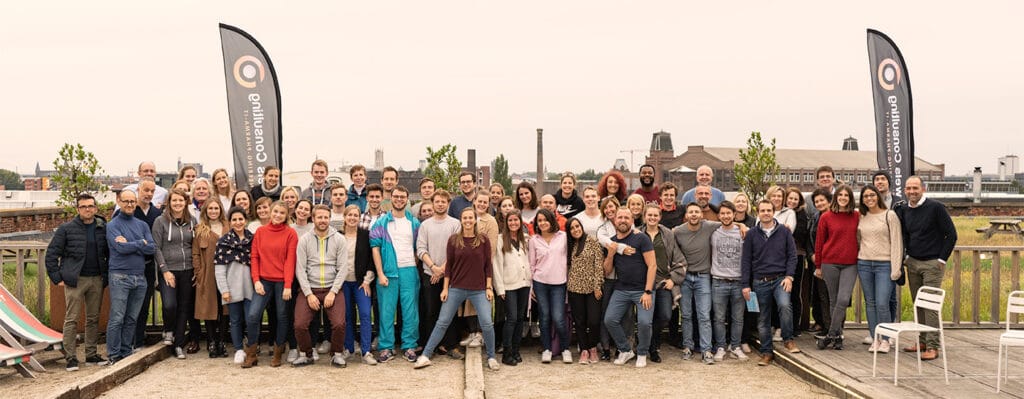Application tips
3 questions to prepare for your job interview
Congratulations! Your resume and motivation letter have resulted in an invitation by a recruiter. You are invited for a job interview! What's next?
Now the idea of being interviewed for a new job is scaring the living daylights out of you. Don’t panic! With the help of 3 simple questions you will be able to prepare yourself for your job interview:
- Where do you want me to start?
- Who are they, what are they doing and where do they want to go?
- Who is sitting at the opposite side of the table?
Where do you want me to start?
Job interviews often start with the question “Can you tell me something about yourself?” This question may seem very simple, but your answer can be very decisive for your (first) impression on the recruiter. If you put too much emphasis on the present it may seem like you’re trying to cover up the past. And if you start your answer too far in the past the recruiter might think you are still living in the past.
In job interviews, answering open questions can be trickier than you think. Luckily there are some simple tips on how to answer open questions about yourself:
- “Where do you want me to start?”
Answer open questions like “Can you tell me something about yourself?” in a polite manner with a counter-question such as “Where do you want me to start?”. By asking the recruiter for a brief clarification you will be able to give a better answer. Never ask a recruiter “What would you like to know?”. When you are fully giving the question back it may seem that you are not prepared for the interview or that you want to test the recruiter. This is obviously not a good idea.
- The “30 seconds pitch”
When you are in an elevator and a recruiter or colleague asks you to tell something about yourself, what is your answer? Make sure you can introduce yourself in 30 seconds or less, well before you should step out of the elevator. You can practice a “30 seconds pitch” or an “elevator pitch” in front of the mirror. Make a story about yourself and then reduce it until only the most important aspects of your education, experience, ambitions and distinct skills are left. A “30 seconds pitch” is a superficial presentation. Forget about the details. They can be filled in later. Be brief and concise! You cannot practice this presentation enough. The presentation should sound natural at any time and any place.
- “What is your added value for our company?”
Before the job interview, think about your added value for the company you are applying with. Make sure this answer corresponds to and/or forms an extension of your presentation in your motivation letter. Use the answer to this question to highlight any skills you have built up in extra-professional activities, provided that they can help you with the executing of the job for which you are applying. This will highlight your skills and your personality. - “Once upon a time…” – the short version!
During an interview, it is important to formulate your answers as a brief, concise and enthusiastic story. It is not nice for the recruiter when the candidate cannot bring his or her own story. It gets even worse when candidates have forgotten parts of ‘their story’; when they cannot explain certain parts of their resume. So walk through your resume a couple of times before taking a job interview.
Who are they, what are they doing and where do they want to go?
The answers to these questions are defining your interviewers. Make sure you know the answers to these questions before the job interview. This will help you to tailor your answers to the needs and expectations of your interviewers.
Usually, you can find all the information you need on the website of the company you are applying for. Concentrate especially on the following items:
- History: Discover where, when and how the company started and where it is heading. There is no future without a past! You don’t have to remember all the strategic decisions, but try to know the overall evolution and milestones of the company’s history.
Industry. Read more about the industry the company is operating in. See how the company is presenting itself in the market and how it is positioning itself with regard to the competition. Form your own opinion about this so you can articulate a substantiated and inspiring answer should you be asked to do so. - Structure: Check out, if possible, an organization chart of the company you are applying with. Maybe you know some people who work for the company? An organization chart shows the structure of a business. Find out where your job will fit in.
- Mission and vision: Can you identify yourself with the mission and vision of the company you are applying with? If this is the case then you have come to the right place. Try to find some examples which show that you have the same values as the company you are applying with. This will help you make a positive connection during the interview.
- News: Keep an eye on newspapers, magazines, brochures and social media to gather more information about the company and to respond to recent events such an award or a donation to charity. Responding to news is often a nice way to break the ice at the beginning of the job interview. It shows that you are well informed and that you are aware of and interested in the activities of the company.
Who is sitting at the opposite side of the table?
You may have your job interview with a recruiter from the company you are applying with, but you can also encounter a third party recruiting company. Try to find out who will be sitting on the other side of the table and search for information about your interviewers.
- The number of partners in dialogue: How many and which people will be sitting at the table? Ask the recruiter beforehand which people will be present during the job interview and what their function is (e.g. supervisor, direct colleague, etc …). Bring enough resumes of yourself to the interview so everyone will have a copy.
- Assessments: Sometimes you will have to take an assessment before, during or after a job interview to demonstrate your knowledge and skills. A language test is a classic example of such a test. Make sure you are honest in your resume and that you refresh your knowledge and skills before the job interview.
- Formal or informal? Prior to the job interview, ask the recruiter how the conversation will be organized and what will be discussed. Also, check the dress code. You don’t want to be dressed too formal or (even worse) too informal.
- Social media: In our previous article you could read more about the use of social media by recruiters. You can do the same! Do not forget to study the online profiles of your interviewers before the interview. This will give you more insight into the careers and values of your interviewers.
A good start is half the battle
In this article, we have discussed how you can prepare yourself for a job interview by answering 3 easy questions. A good start is half the battle. If you are able to answer these questions then you will make a good impression during the job interview.








 Tip 2: Determine in advance which companies you’d like to visit
Tip 2: Determine in advance which companies you’d like to visit Tip 5: Pay attention to your verbal and nonverbal communication
Tip 5: Pay attention to your verbal and nonverbal communication Tip 9: Send thank-you emails or a LinkedIn invite
Tip 9: Send thank-you emails or a LinkedIn invite 2. Create a ‘career narrative’ for good friends
2. Create a ‘career narrative’ for good friends 4 Key characteristics of a good elevator pitch
4 Key characteristics of a good elevator pitch Project Sourcing
Project Sourcing